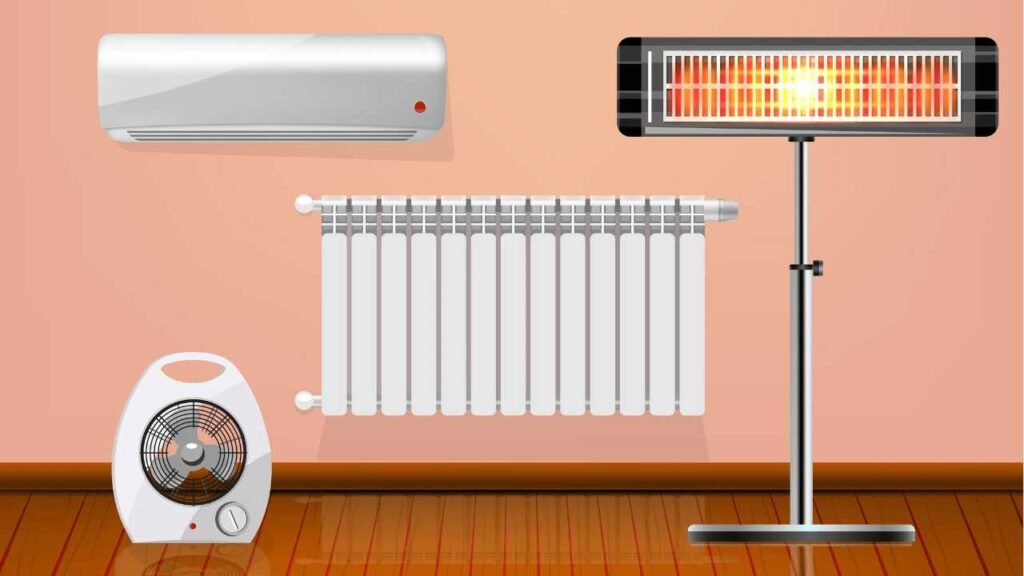Introduction
Space heaters are now a quick and easy way to heat up small indoor spaces like rooms, offices, and workshops. The main goal of electric space heaters, infrared space heaters, and propane space heaters is the same: to quickly and safely heat a space where central heating may not be enough.
This complete guide tells you everything you need to know about space heaters, including how space heaters work, the different types, how much electricity they use, which ones are best for different rooms, and how to use them safely.
What is a Space Heater?
An electric space heater is a device that heats up a small area or a single room, rather than an entire building. It works by blowing hot air with a fan, which rises and pushes colder air down. This helps to spread the warmth around the room.
Most space heaters for home are electric and portable, making them easy to move and place where needed. You will find space heaters for indoors, space heaters for large rooms, best small space heaters for compact spaces, and even outdoor or workshop heaters.
Space heaters are ideal for:
- Bedrooms
- Offices
- Garages
- Basements
- Living rooms
- Personal comfort zones
Types of Space Heaters
If you don’t know the words, picking out a space heater can be hard. There are two main types: electric space heaters and space heaters that burn fuel.
Electric heaters are generally safer, especially when used indoors. They use either convection, infrared, or radiant heaters to work.
1. Convection Heaters
Convection heaters warm the air in a room. Warm air rises, cooler air sinks, and the cycle distributes heat evenly.
Pros: Good for large rooms, gradual and uniform heating
Cons: Takes longer to heat up
These are popular as electric space heaters for large rooms.
2. Radiant / Infrared Heaters
Infrared space heaters produce heat by emitting infrared radiation, directly warming people and objects, not the air.
Pros: Fast heating, energy efficient for targeted use
Cons: Heat is localized, not ideal for big rooms
Best used in offices, garages, and workstations.
3. Ceramic Heaters
Ceramic heaters heat a ceramic plate and use a fan to circulate warm air.
Pros: Quick heating, portable, adjustable settings
Cons: Fan noise
Commonly used as good space heaters for living rooms and bedrooms.
4. Propane Space Heaters
These heaters burn propane fuel to produce heat.
Pros: No electricity needed, powerful heat output
Cons: Must be used with proper ventilation
Not recommended for small, sealed indoor rooms.
5. Battery Operated Space Heaters
These are not designed for whole-room heating but work well for camping, outdoor use, or emergency heat.
How Space Heaters Works and Generate Heat: The Science Simplified
All space heaters have a heating element inside. Resistive heating elements, like a resistor, turn electricity into heat—picture water flowing through a hose, but with heat instead.
Ceramic works the same way but keeps heat better, so it’s great for lasting warmth.
Thermostats and Heat Control
Space heaters are handy because they help control the temperature. Thermostats inside them measure the temperature and can turn the heater on or off to keep it at a set temperature. It’s like deciding whether to put on or take off a layer of clothes depending on how cold you are.
Mechanical vs. Digital Thermostats
Mechanical thermostats use a bimetallic strip that expands or contracts with temperature changes, while digital ones use electronics for more precise control.
Space heaters use either:
| Thermostat Type | How It Works | Benefit |
|---|---|---|
| Mechanical | Expanding bimetallic strip | Simple & durable |
| Digital | Electronic temperature sensor | Accurate and energy efficient |
Do Space Heaters Use a Lot of Electricity?
This is a common question — and it depends.
Most space heaters are rated at 1500W, which uses:
1.5 kW × 1 hour = 1.5 kWh electricity per hour
If your electricity price is $0.15 per kWh:
1 hour of heating ≈ $0.22If you want energy efficient space heaters, look for:
- Thermostat controls
- Eco modes
- Programmable timers
- Infrared heaters
Why Are Space Heaters Limited at 1500W?
Most household electrical circuits are 15 amps. A 1500W heater uses nearly the full safe load capacity of a standard wall outlet. Higher wattage would risk overheating or tripping breakers, which is why manufacturers limit the power.
Choosing the Right Space Heater
| Space Type | Recommended Heater Type | Example Use |
|---|---|---|
| Large rooms | Convection or ceramic heater | Living room |
| Personal heating | Infrared heater | Desk or workstation |
| Spaces without electricity | Propane heater | Cabin or workshop |
| Small rooms | Ceramic or oil-filled | Bedroom |
| Portable heat | Battery operated space heater | Camping |
Also read – How Propane Refrigerator Works?
Are Space Heaters Safe?
Yes — modern safe space heaters include features such as:
- Tip-over shutoff
- Overheat protection
- Cool-touch exterior
- Auto power-off timers
However, follow these guidelines:
- Keep 3 feet of clearance around the heater
- Place on stable flooring
- Never cover the heater
- Don’t use extension cords
- Do not leave unattended while sleeping
How to Use Space Heaters Safely?
When it comes to any heating device, safety is the most important thing to remember. Modern space heaters have safety features built in, like auto shut-off to keep them from getting too hot, tip-over switches that turn the heater off if it falls over, and cool-to-the-touch surfaces to keep pets and kids safe.
Space Heater Safety Tips
- Buy a space heater that has the right safety features.
- Do not leave the space heater alone: Space heaters are a quick and effective way to heat up a room. There is no reason to leave the space heater on if no one is in the room. If you aren’t there, turn it off to lower the risk of damage.
- There should be at least three feet of space between this and anything else: Space heaters make a lot of concentrated heat, so it’s important to keep them away from anything that could catch fire or get too hot.
- Don’t let kids near the space heater: It’s not worth it to use space heaters because they put kids at too high of a risk of getting hurt.
- Check to make sure your smoke and carbon monoxide detectors are working.
Best Space Heaters : Buying Considerations
When searching for the best space heaters, most recommended space heaters, or top ranked space heaters, evaluate:
✔ Heat output (watts)
✔ Energy efficiency
✔ Safety features
✔ Noise level
✔ Warranty and durability
This ensures you select a top space heater suited to your home setup.
Top Recommended Space Heaters
Selecting the right space heater depends on room size, heating preference, safety concerns, and portability needs. The following models are widely recognized for their performance, safety, and user satisfaction.
This list covers electric space heaters, infrared models, and space heaters for large rooms, ensuring you can choose based on your space and comfort level.
| Heater Type | Model Type | Best For | Key Advantages |
|---|---|---|---|
| Digital Ceramic Tower Heater (1500W) | Ceramic Electric Space Heater | Bedrooms, Living Rooms | Fast heating, thermostat control, oscillation, energy efficient |
| Infrared Quartz Heater Cabinet | Infrared Space Heater | Offices, Workstations, Personal Heating | Direct warmth, quiet operation, maintains moisture in air |
| Oil-Filled Radiator Heater | Convection Heater | Spaces needing long-lasting, silent heat | No fan noise, holds heat longer, steady temperature |
| Portable Propane Heater | Propane Space Heater | Garages, Workshops, Outdoor Use | Does not require electricity, strong heat output |
| Compact Desk Ceramic Heater | Small Space Heater | Desks, small bedrooms, study tables | Budget friendly, lightweight, good for personal use |
| Smart Wi-Fi Enabled Space Heater | Electric Space Heater with App Control | Modern Homes & Remote Control Users | Mobile app thermostat, timers, energy usage monitoring |
Choosing Based on Room Size
| Room Size | Recommended Wattage | Ideal Heater Types |
|---|---|---|
| Small Rooms (up to 150 sq. ft.) | 400–1000W | Compact ceramic |
| Medium Rooms (150–300 sq. ft.) | 1000–1500W | Ceramic tower, oil-filled |
| Large Rooms (300+ sq. ft.) | 1500W + design efficiency | Convection or electric heaters for large rooms |
If you are shopping offline, Lowe’s home improvement space heaters offer a wide selection that includes safe space heaters, infrared units, and best small space heaters suitable for everyday indoor comfort.
Energy Efficiency Recommendations
To reduce electricity usage while staying warm:
Choose heaters with eco mode
Use a digital thermostat
Avoid running continuously at maximum heat
Keep room doors and windows closed while heating
This helps answer the common question:
Do space heaters use a lot of electricity?
→ They can, but choosing energy efficient space heaters and operating them correctly lowers cost significantly.
Most Recommended Space Heaters for Different Needs
| Need | Recommended Heater Type |
|---|---|
| Fast personal warmth | Infrared heater |
| Silent and steady heating | Oil-filled radiator |
| Heat for large rooms | Ceramic tower or convection heater |
| Portable and compact heating | Best small space heaters (desk models) |
| No electricity / outdoor use | Propane space heaters |
| Smart home automation | Wi-Fi enabled electric space heaters |
Summary: Staying Warm
Understanding how space heaters work, the types available, their power usage, and safety practices helps you choose the most suitable heater for your environment. Whether you need space heaters for indoors, for large rooms, or compact small space heaters, making an informed choice ensures comfort, efficiency, and peace of mind.
Also read – How Does a Microwave Work to Heat Food?
Frequently Asked Questions (FAQs)
This FAQ section is designed to provide quick and clear answers to the most common inquiries we receive. We encourage you to click on a question to find the information you need. If you can’t find an answer here, please don’t hesitate to visit our Contact Us page for further assistance.
Can space heaters heat an entire house?
No. Space heaters are designed to warm a single room or small area, not an entire home. For whole-house heating, a central heating system or heat pump is more efficient.
Which is better: infrared heater or ceramic heater?
Both are effective, but they work differently:
- Infrared heaters warm objects and people directly, making them ideal for personal heating.
- Ceramic heaters warm the air, making them suitable for small to medium-sized rooms.
Choose based on whether you want room heating (ceramic) or direct warmth (infrared).
How long can I run a space heater?
Most safe space heaters can run for several hours, but avoid overnight use unless the heater has:
- Tip-over shutoff
- Overheat protection
- A certified safety label (UL / ETL / CSA)
Can I plug a space heater into an extension cord?
No. Most space heaters draw high wattage and should be plugged directly into a wall outlet to prevent overheating or electrical fires.
Why do most space heaters have a 1500W power limit?
They can. A 1500W heater running for 1 hour uses:
1.5 kWh of electricity
Running it continuously will increase your electricity bill. Choose energy efficient space heaters with thermostats and eco modes to reduce cost.
What is the best type of space heater for large rooms?
For large rooms, choose:
- Ceramic tower heaters
- Convection heaters
- Electric space heaters for large rooms with oscillation and fan distribution
These types spread heat evenly across wider spaces.
What is the best space heater for personal use at a desk?
Best small space heaters (compact ceramic or infrared desk heaters) are ideal because they deliver localized warmth without heating the entire room.
Do space heaters dry out the air?
Convection and ceramic electric space heaters may dry out the air slightly. However, infrared space heaters do not dry out air because they heat objects, not air molecules.
Can space heaters start fires?
Modern safe space heaters include protection systems, but misuse can be dangerous. Keep:
- 3 feet clearance from curtains, bedding, furniture
- Do not place near water sources
- Ensure smoke detector and carbon monoxide detector are functioning
Are battery operated space heaters powerful enough to heat a room?
No. Most battery operated space heaters are intended for emergency or outdoor use, not room heating. They provide short-term, low-output heat, not sustained warmth.
Having any queries? – Do reach us at info@scivoyage.com













2 thoughts on “How Space Heaters Works”
Some truly nice stuff on this website , I like it.
I’ve been surfing on-line more than 3 hours nowadays, but I never found any interesting article like yours. It is beautiful price sufficient for me. In my view, if all site owners and bloggers made just right content material as you did, the net will probably be a lot more useful than ever before.